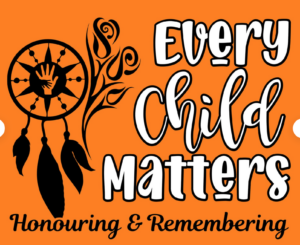
Logo Design by TinnyBooDesigns for Orange Shirt Day - Used with Permission
It seems in 2020, we still have so much more to learn about empathy, healing and understanding all forms of trauma to better understand what being trauma-informed entails. My heart goes out to those trying to raise better understanding of societal trauma and the fact that this still is prevalent in our day and age. It comes as a double burden to our fellow African-Americans to explain again that it’s not just generational trauma, but societal trauma that needs to be addressed. We Americans,as a nation, continue to travel the same well-trodden path with the same injustices. The only way to a new and better way is for everyone to be aware and mindful of the experiences others have endured. To make my point, I ask my readers to reflect on a day dedicated to understanding our Native American and Indigenous Peoples experience who have dedicated September 30th as a day recognizing the cultural, societal, and generational trauma with a goal of healing and rising above the past.
In 2015, the release of a report of the Truth and Reconciliation Commission of Canada shocked Canadians with the details of a brutal and horrifying practice of Indian Residential Schools policies that ripped Native children from their childhood homes and families and placed them – often many miles away. The report listed 94 calls for action for reconciliation that the Truth and Reconciliation Commission of Canada declares “establishment and operation of residential schools were a central element of this policy, which can best be described as “cultural genocide.”” [emphasis added]. [paraphrased from https://www.ictinc.ca/blog/what-is-orange-shirt-day]
Like those Canadians who were oblivious and shocked to learn of this practice, I first learned as an adult American in my late thirties, that we also had “Indian Boarding Schools” in the United States. How is it that this part of history continues to be omitted from U.S. Public School curriculum? From the first policies established in 1819 leading to a compulsory attendance law in 1891 “that enabled federal officers to forcibly take Native American children from their home and reservation.” [https://en.wikipedia.org/wiki/...ian_boarding_schools]. I was astonished and dismayed to learn “Indian Boarding Schools” were still running right up to 1973 – the year I graduated high school. In the U.S. it was not until 1978, that the Indian Child Welfare Act gave Native American parents the legal right to deny their child’s placement in the school.
On September 30th, I ask my readers to take a moment to read more about the impact of generational and societal trauma created. It is my hope that in this current day of Black Lives Matter that we can better understand the trauma they are talking about in their story. You see, the story is well-understood also by our Native American brothers and sisters. It is a lesson we need to reflect on and learn from in order to move forward in a positive, loving way and to create a truer peaceful, democratic republic.
Here are some links for further reading – but please don’t stop with this short list:
Wikipedia – https://en.wikipedia.org/wiki/...ian_boarding_schools
“What is Orange Shirt Day?” – https://www.ictinc.ca/blog/what-is-orange-shirt-day
Phyllis’ Story – https://www.orangeshirtday.org/phyllis-story.html
Local Seneca Nation of Indians Event – Remember the Removal 2020
The Sad History of Child-size Handcuffs – Article by Rebecca Onion
National Native American Boarding School Healing Coalition – U.S. Indian Boarding School History
Susquehanna Life – Sept 2014 Issue – Native American History: Zitkala-Ša, Teacher and Advocate By Nancy Bates (Back Issue fee)
In honor of my Seneca friends and with respect for all Native Peoples and for the hope of a new and better understanding toward one another,
Dëjíhnita:ë’
(deh-jee-nee-tah-eh) Seneca language word of farewell meaning “We will talk again!”



Comments (0)